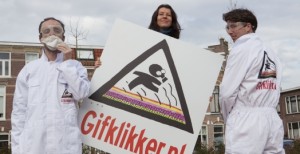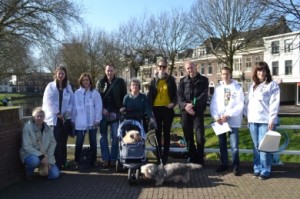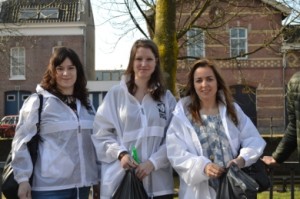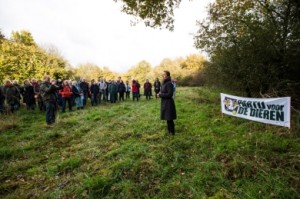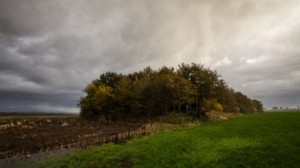Nieuw Worldlog Marianne Thieme
Mooi succes deze week: landbouwgif moet uit de schappen van Nederlandse tuincentra! Vanaf eind 2015 mag het gevaarlijke landbouwgif glyfosaat niet langer aan particulieren verkocht worden. Glyfosaat is een bestanddeel van RoundUp, dat ook aan particulieren wordt verkocht als onkruidbestrijder. Glyfosaat wordt in toenemende mate in verband gebracht met gezondheidsproblemen als onvruchtbaarheid, geboorteafwijkingen, aantastingen van het zenuwstelsel, ziekte van Parkinson en verschillende vormen van kanker. Naast de gezondheidsrisico’s voor de mens leidt het gebruik van chemische bestrijdingsmiddelen bovendien tot verlies van biodiversiteit en tot steeds moeilijker te zuiveren drinkwater.
Afgelopen week en weekend weer druk in de weer geweest voor de gemeenteraadsverkiezingen. Gisteren heb ik meegelopen met een wijkexcursie in Utrecht om onder andere te kijken naar voldoende ruimte voor fietsers, voldoende speelplaatsen voor kinderen en voldoende hondenuitlaatplekken. En morgen (dinsdag 11 maart) ga ik een protestboom planten in Amsterdam samen met kinderen van basisschool Cosmicus Impuls uit Amsterdam-Noord.
Deze week bevestigde de staatssecretaris dat Staatsbosbeheer (het staatsbedrijf dat voor een groot deel de Nederlandse natuur beheert) stopt met de verkoop van natuur! Na onze succesvolle natuur-aankoopactie lijkt de uitverkoop van natuur voorlopig dus van de baan. Vorig jaar rond deze tijd werd namelijk bekend dat Staatsbosbeheer delen van de natuur zou gaan verkopen aan de hoogste bieder. Wij hebben toen een woudfundingsactie opgezet om delen van de natuur samen met natuurliefhebbers te kopen. Dit was zeer succesvol! We haalden in ruim 2,5 week tijd ruim tweeënhalve ton op en kochten ook delen van de natuur op.
Zeer interessant artikel in The New York Times over het einde van het verschil in ontwikkelingslanden en ontwikkelde landen.
Tot volgende week!
Marianne
A great success this week: agricultural chemical is to go off the shelves of Dutch garden centres! As of the end of 2015, the harmful agricultural chemical glyphosate will no longer be sold to private persons. Glyphosate is a compound of RoundUp, which is also sold to private persons as a weed killer. Glyphosate is increasingly connected to health problems such as infertility, birth defects, damage to the nerve system, Parkinson disease and various forms of cancer. In addition to the health risks for humans, the use of chemical pesticides further leads to the loss of biodiversity and increased complications for the purification of drinking water.
Last week and weekend, we have been actively campaigning for the municipal elections. Yesterday, I went along on an excursion in a Utrecht district to see if there is sufficient room for cyclists, enough outdoor playgrounds for children, and sufficient places to walk dogs. And tomorrow (Tuesday the 11th of March) I am going to plant a ‘protest tree’ in Amsterdam, together with the pupils of the primary school Cosmicus Impuls in Amsterdam-Noord.
This week, the State Secretary confirmed that Staatsbosbeheer (Forestry Commission, the state company that manages a large part of the Dutch nature areas) will stop the selling of nature. After our successful action to buy parts of nature, the sale of nature seems to to have been put aside for a while. Last year around this time it was announced that Staatsbosbeheer was going to sell parts of nature to the highest bidder. We then set up a forest funding action to buy parts of nature together with nature lovers. That was very successful! We raised more than two hundred and fifty thousand euros and also bought parts of nature.
Here is a very interesting article in The New York Times about the end of the difference between developing countries and developed countries.
Until next week!
Marianne
